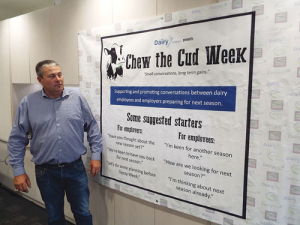Employers aren't paying enough attention to retaining the employees they have for the next season.
The scale of the New Zealand dairy industry is seen in the numbers: revenue of $14 billion, 12,000+ farmers and 34,000+ employees.
Then look at the negative side of the ledger: the industry is consistently 7% understaffed and has about 900 vacancies at any time.
So why do employers pay insufficient attention to retaining the employees they have for the next season?
This and other questions arose at recent ‘Chew the Cud’ meetings at Ashburton and Te Awamutu, run by the recruitment company NZ Dairy Careers and supported by DairyNZ, Federated Farmers and Fonterra Farm Source.
The aim was to encourage dairy employers and employees to start talking about the following season much earlier in the preceding season rather than just before Gypsy Week, so removing uncertainty – for both parties – about whether an employee would stay or go.
Employers are often afraid to broach the stay/go issue, the anecdotal evidence showed. And a typical worker review might go something like, “How ya doing?”, bringing a response, “Yeah, good.”
The ‘Chew’ meetings urged employers, especially, to start talking sooner rather than later.
An employer might say, “Have you thought about next season?” or “We’re keen to have you back next season” or “Let’s do some planning before gypsy week.”
The employee then hopefully responds, “I’m keen to come back for another season” or “I’m looking at next season already.”
NZ Dairy Careers managing director Matt Jones says many employers feel awkward about initiating conversations about where employees are heading, so they keep putting them off.
“We understand that starting a conversation may be difficult, more so if it’s about an employee staying or leaving. The fact is, the management of your business needs plans to be made early because in April/May the best employees have been snapped up or someone you are happy with has arranged to leave, solely because nobody’s discussed it.”
Facilitators at the ‘Chew the Cud’ meetings proposed a framework of relevant questions that both parties should be asking to ease everyone into conversation. Typical subjects could be career development for an employee or areas of weakness needing work, with help from the employer or outside agencies.
Salary or remuneration packages, often a difficult subject, shouldn’t be overlooked, especially given that an employee may find it more difficult to discuss this with a current employer than with a prospective employer.
Diary those talks for the early part of the year, was the advice.











